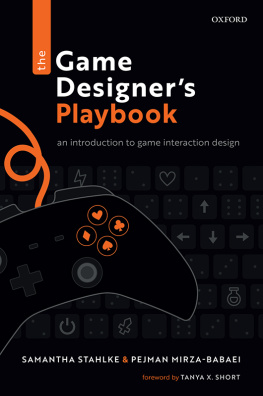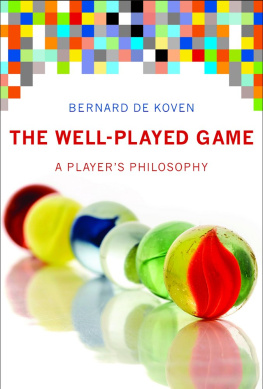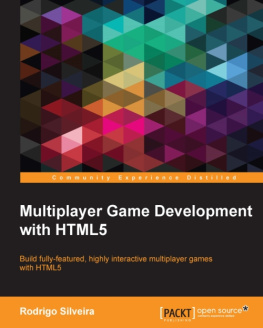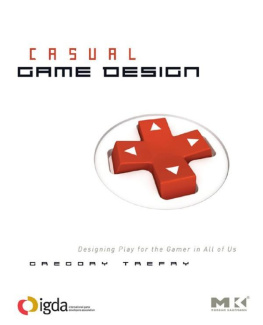Players Making Decisions
Game Design Essentials and the Art of Understanding Your Players
Zack Hiwiller

Players Making Decisions:
Game Design Essentials and the Art of Understanding Your Players
Zack Hiwiller
New Riders
www.newriders.com
To report errors, please send a note to
New Riders is an imprint of Peachpit, a division of Pearson Education
Copyright 2016 by Zachary Hiwiller
Senior Editor: Karyn Johnson
Development Editor: Robyn G. Thomas
Production Editor: Danielle Foster
Copyeditor: Rebecca Rider
Proofreader: Patricia Pane
Compositor: Danielle Foster
Indexer: FireCrystal Communications
Interior Design: Danielle Foster
Cover Design: Mimi Heft, with Zack Hiwiller
Notice of Rights
All rights reserved. No part of this book may be reproduced or transmitted in any form by any means, electronic, mechanical, photocopying, recording, or otherwise, without the prior written permission of the publisher. For information on getting permission for reprints and excerpts, contact .
Notice of Liability
The information in this book is distributed on an As Is basis without warranty. While every precaution has been taken in the preparation of the book, neither the author nor Peachpit shall have any liability to any person or entity with respect to any loss or damage caused or alleged to be caused directly or indirectly by the instructions contained in this book or by the computer software and hardware products described in it.
Trademarks
Many of the designations used by manufacturers and sellers to distinguish their products are claimed as trademarks. Where those designations appear in this book, and Peachpit was aware of a trademark claim, the designations appear as requested by the owner of the trademark. All other product names and services identified throughout this book are used in editorial fashion only and for the benefit of such companies with no intention of infringement of the trademark. No such use, or the use of any trade name, is intended to convey endorsement or other affiliation with this book.
ISBN-13: 978-0-134-39675-0
ISBN-10: 0-134-39675-8
9 8 7 6 5 4 3 2 1
Printed and bound in the United States of America
Dedication
To my grandmother, Betty Hiwiller (19272014), who always wanted me to be a writer. Yes, textbooks count, Grandma.
Acknowledgments
First, I would like to thank my wife, Gloriana, and my parents, Dan and Jan Hiwiller, for always tolerating me and encouraging me. Although the former would have been enough, the latter is greatly appreciated.
I would like to thank everyone who provided comments and support on early drafts. Many helped, but Mark Diehr, Matthew Gallant, and Scott Brodie did a yeomans job on a short turnaround, even though they have extremely busy professional careers. If Uncharted 4 is delayed, please do not blame me.
Everything that looks professional within is thanks to the wonderful team at Pearson including Robyn Thomas, Rebecca Rider, Danielle Foster, Patricia Pane, and Karyn Johnson.
I would like to use this space to thank Jesse Schell for convincing me game design could yield a career and be intellectually interesting. Id like to thank Jon Dean, James Hawkins, and Jason Barnes for being early examples to me of what leadership looks like among game industry professionals. I would also like to thank all my friends and colleagues at Project Horseshoe, the best community of game designers in the world.
Finally, I cannot forget the dedicated staff and faculty of the Game Design program at Full Sail University who have helped me refine my approach to communicating the practice of game design, including, but not limited to, Ricardo Aguilo, Dax Gazaway, DJuan Irvin, Christina Kadinger, Michael Lucas, Kingsley Montgomery, Andrew OConnor, Mark Pursell, Brian Stabile, and Lee Wood.
About the Author
Zack Hiwiller is a game designer, educator, and writer who lives in Orlando, Florida. He is a department chair for the Game Design degree program at Full Sail University and does consultant work for many large and small companies. Previously, in addition to independent projects, he was a designer at Gameloft and Electronic Arts. He holds a Bachelors degree in Information Systems from Carnegie Mellon University and a Masters degree in Modeling and Simulation from the University of Central Florida. His writings at hiwiller.com have been reposted by Kotaku, GameSetWatch, and other sites and have reached over 2 million readers. You have probably seen something of his reposted without attribution on sites like 9GAG, BuzzFeed, TheCHIVE, and others. Mark Zuckerberg used an image from one of his blog posts in his keynote at the 2011 F8 conference, and although he would have liked to have been cited, he actually thought it was pretty cool. In the fall months, he serves as an official for high school football games in central Florida.
Preface
If you wish to make an apple pie from scratch, you must first invent the universe.
CARL SAGAN
This Carl Sagan quote from Cosmos intends to cheekily point out that even a simple object like an apple pie contains a multitude of layers, depending on your level of analysis. Although the baker feels that the apples, sugar, and flour are the fundamental building blocks of an apple pie, the physicist sees down to the atoms and fundamental particles that make up the pie itself. It is a profound and long-lasting quotation because of the disconnect that the listener experiences. Making an apple pie is prosaic. Inventing the universe is deity-level stuff.
Teaching game design offers a similar conundrum. Making games is fairly easy, as is apparent from looking at the number of available games. For example, when you look at the games available for just a single platform (iOS) in a single country (the US) at the time of this writing, youll see that there are nearly 400,000 games available. And, of course, the number of games children create every day on playgrounds all across the world is uncountable. With so many games coming out every day, games surely must be easy to make. As a result, teaching about games must be fairly straightforward and simple.
.
.
Unfortunately, that is not true.
The primary reason is that there is no reliable algorithm that we can use to create things as wildly disparate as Chess, Grand Theft Auto V, Red Rover, pole vaulting meets, and Jeopardy!. A cursory listing of the skills a game designer of any type will find useful includes mathematics, psychology, computer programming, composition, rhetoric, drafting, architecture, art history, philosophy, economics, business, history, education, mythology, and animation. I stopped the list not because it was complete, but because I think the listas incomplete as it ismakes the point that game design is remarkably multidisciplinary.
Because no algorithm exists, we have to attempt to shoehorn the facts and methods of a universe of disparate disciplines to make game design heuristics. Meanwhile, the impatient student just wants to make a simple apple pie.
When I first left the world of full-time development of video games to teach game design, I faced this very problem of distilling a vast universe down to a few salient points. I voraciously consumed every book I could find about design or game design and found that they largely talked about the process from a descriptive perspective. That was useful in some aspects, but not useful when I was looking to teach a prescriptive method. Most game design books were ludicrously padded with obvious statements that were not at all helpful to aspiring or professional designers. Some books, like Schells





![Jesse Schell [Jesse Schell] - The Art of Game Design, 2nd Edition](/uploads/posts/book/119435/thumbs/jesse-schell-jesse-schell-the-art-of-game.jpg)
![Ethan Ham [Ethan Ham] - Tabletop Game Design for Video Game Designers](/uploads/posts/book/119417/thumbs/ethan-ham-ethan-ham-tabletop-game-design-for.jpg)
![Chris Bateman [Chris Bateman] - Beyond Game Design: Nine Steps Toward Creating Better Videogames](/uploads/posts/book/119409/thumbs/chris-bateman-chris-bateman-beyond-game-design.jpg)


